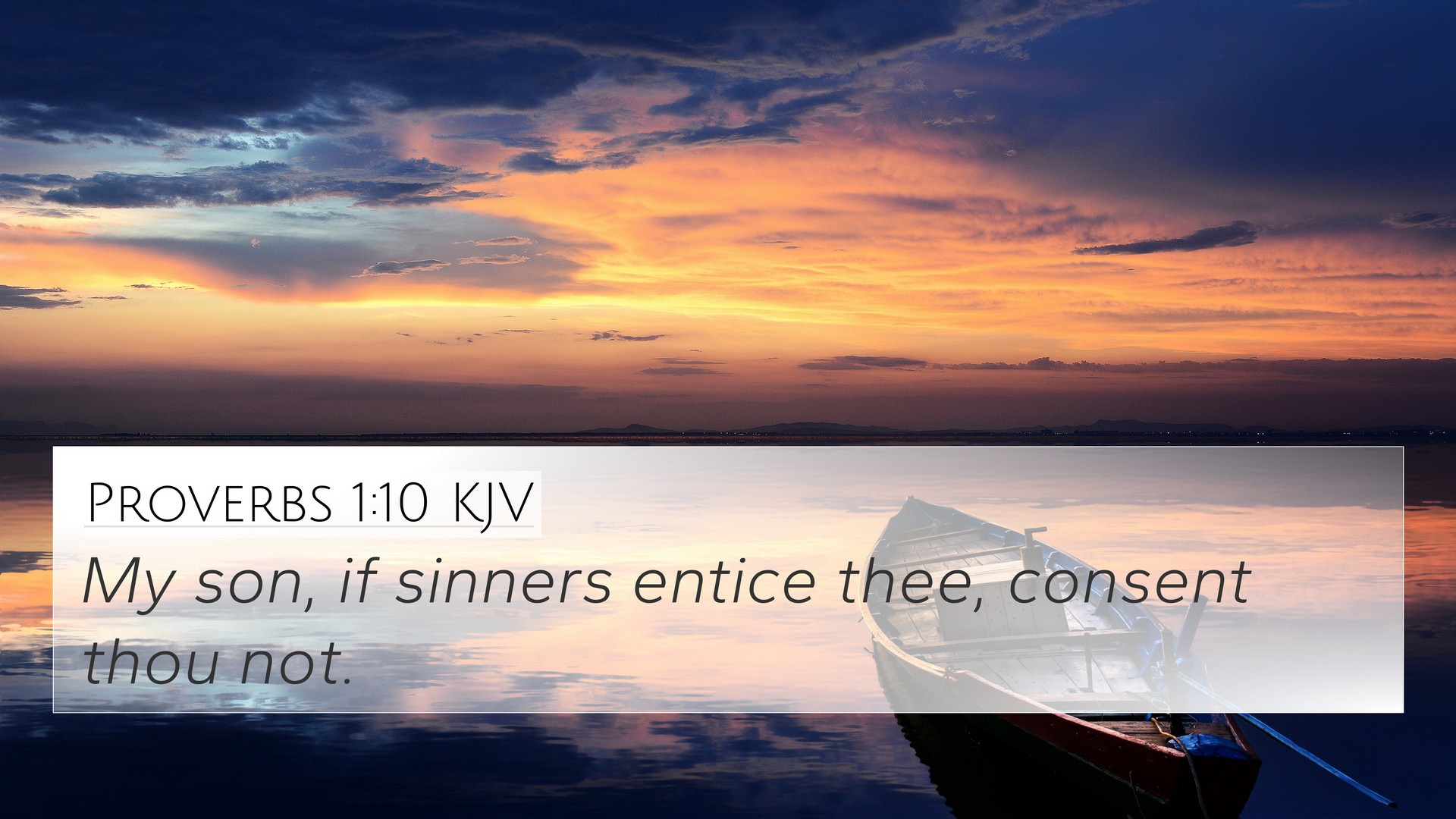Understanding Proverbs 1:10
Proverbs 1:10 states, "My son, if sinners entice you, do not consent." This verse serves as a cautionary advisory to steer clear from the persistent temptations offered by those who would lead one astray.
Summary of Insights
This verse reflects the core theme of wisdom literature in Proverbs, urging individuals, particularly the young, to resist peer pressure and the allure of sinful behavior. Various public domain commentators provide rich interpretations that enhance our understanding.
Commentary Insights
-
Matthew Henry:
Henry emphasizes the paternal tone of advice, indicating the deep concern for the son’s moral integrity. He stresses the importance of vigilance against external influences that could lead one away from righteousness.
-
Albert Barnes:
Barnes highlights the psychological aspect of temptation, noting how easy it is for individuals to be swayed by peers who promote wickedness. He suggests that wisdom involves a conscious decision to reject such enticements.
-
Adam Clarke:
Clarke provides a historical context, noting that during biblical times, peer group influences were significant. He encourages vigilance and readiness to oppose those who would compromise moral values.
Bible Cross References for Proverbs 1:10
To deepen our understanding of this scripture, we can explore related Bible verses:
- James 1:14-15: Discusses how temptation leads to sin, aligning with the warning to avoid sinful enticement.
- 1 Corinthians 15:33: Reminds us that bad company corrupts good character, directly relating to the premise of avoiding sinners.
- Proverbs 4:14-15: Advises not to enter the paths of the wicked, echoing the theme of resisting influences.
- Psalm 1:1: Blessed is the man who walks not in the counsel of the ungodly, emphasizing the wisdom of staying clear from sinful counsel.
- Galatians 5:16: Encourages believers to walk in the Spirit to avoid the desires of the flesh, resonating with the message of discernment in Proverbs 1:10.
- Romans 12:2: Admonishes Christians not to conform to the patterns of this world, which parallels the directive to reject sinful invitations.
- 2 Timothy 2:22: Encourages fleeing youthful lusts, enhancing the advice to resist the allurements of sinners.
Connections Between Bible Verses
The thematic connections within scripture often reveal a unified message about the importance of moral integrity and the dangers of temptation. By exploring these Bible verse cross-references, one can better understand how wisdom literature provides guidelines relevant across both the Old and New Testaments:
- Thematic Bible verse connections: Proverbs 1:10 is foundational in understanding the broader narrative regarding sin and righteousness found throughout Scripture.
- Comparative Bible verse analysis: Analyzing Proverbs in light of New Testament teachings on sin can be very enlightening.
- Cross-referencing Biblical texts: Linking passages from Proverbs with teachings from the Epistles showcases a continual emphasis on moral guidance.
Bible Study Tools and Methods
For those engaging in cross-referencing studies, utilizing Bible concordances and cross-reference guides will significantly enhance understanding:
- How to use Bible cross-references: Systematically looking up related verses can reveal a tapestry of biblical advice on resisting temptation.
- Identifying connections between Old and New Testament: Studying cross-references across both Testaments illuminates continuity in God’s message regarding sin and righteousness.
- Comprehensive Bible cross-reference materials: These resources can provide structured pathways for exploring biblical themes and moral teachings.
Conclusion
In essence, Proverbs 1:10 encapsulates a crucial principle in wisdom literature: the need to be vigilant against the seductive nature of sin. By heeding this counsel and engaging in comprehensive cross-references, believers can gain deeper insight into their spiritual journey while reinforcing their commitment to righteousness.













